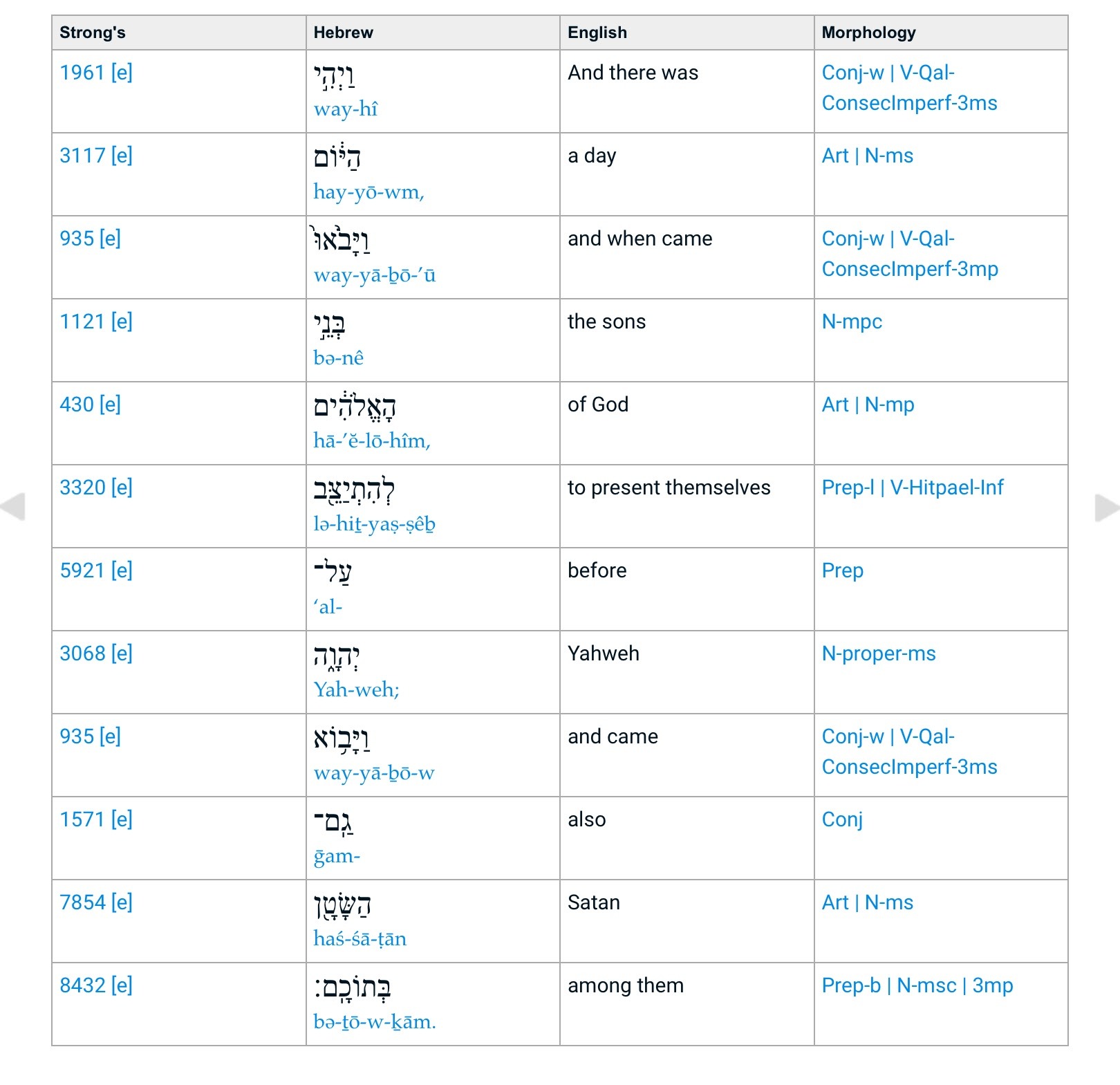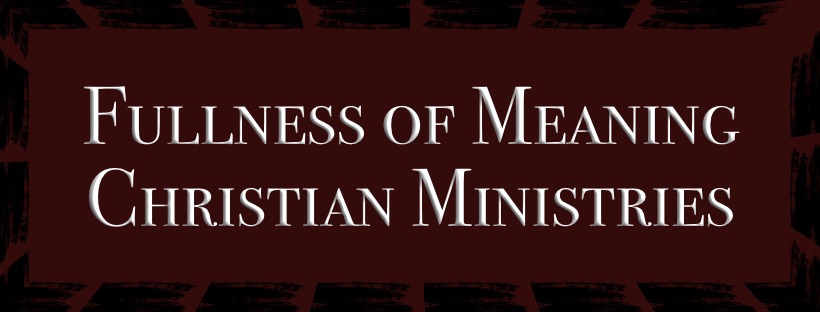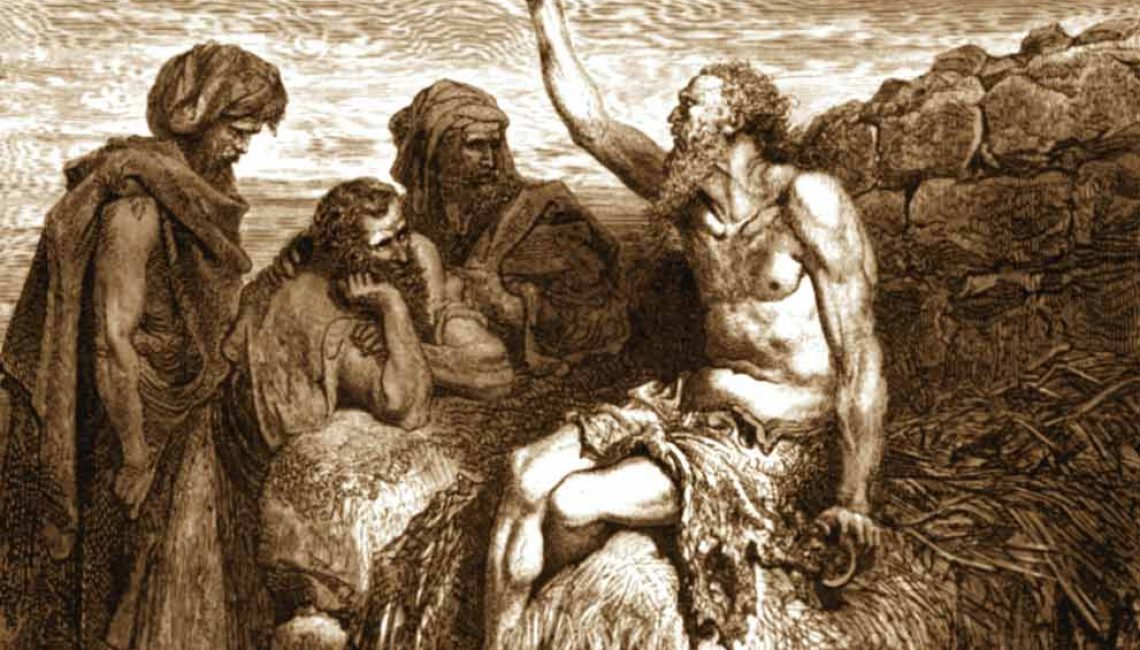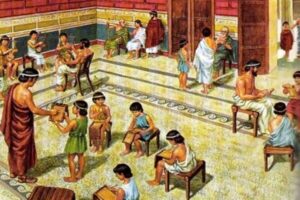The story of Job was initially a pre-Biblical-Mesopotamian story. The account of Job, or “Ayub”/ “Iyob”/ stood the test of time before landing into the canon of the Old Testament. The same message we find in the book of Job is found all throughout Mesopotamia. As for my opinion, I believe this single story gives us archetypes of the “Suffering Servant” -i.e., the Christ figure. Though we see that Job and the Mesopotamian suffering servant/ man of affliction was mortal, we see in all of these early case-stories a consistent Theology. These constant/ consistent factors hold that the Satan, adversary, destroyer of riches (and bringer of riches) was the Deity of goodness. That calamity is ‘good’ if calamity is Sovereignly directed.
The ‘calamitous’ gears in the doctrine of Sovereignty get turned when the Narration unfolds. and solidifies “a” Sovereignty not defined in many Churches today. That is, many claim that “God is Sovereign” but are unwilling (i.e., the fleshly mind cannot acquiesce) to believe that God would create, make, allow “calamity”. Sadly, I’ve heard the word “allow” as ‘another force’ that God ‘lets happen’. This is just another aspect of “dualism” found within the western church. Sadly, even those that would claim “Sovereignty”/ “Pre-Knowledge” and finally, a “Predeterminate” counsel STILL hold to ‘another force’ wielding its way against ‘goodness’, ‘allotments’, ‘health’, etc. that we need to invoke the Deity or God of the Bible to “fight against”. This is why comic books are so popular, I guess—just pick two main deities and have them battle it out for “power’s sake”.
The entire conundrum of dualism can be resolved in believing that God has Preordained ALL things both “good” and “calamitous” —(both working together as ‘signs’ to God). There is no better book that I can find in the Bible ( or any other A.N.E. book {i.e., “ancient near east”}) that works out the Theological-anatomies of non-dualism/ Absolute Predeterminate counsel/ Non-retributive/ Gracious Marriage by the Themed Deity of *The Story*.
Let’s begin:
“Job” means “hated” in the Hebrew. Though, in the Arabic language, “Job” means,
“he who turns to God”. Both meanings are dubious to their origins but the context of Job’s story gives us his ‘name’. That is, the Hebrew word, “shem”, which means “authority” or “name” in how we associate who Job is, or for that matter, we know each other by our ‘shem’. Who else can we be reminded of as a hated man who was without blame and sought to save others to his own demise?–cf. Isaiah 53 – Is this not a prophecy of Christ? Is Job not an archetypical sketch and pattern of the hated one, the Suffering Servant, Jesus?
Job’s “shem” was a man who was righteous, beset with unwarranted affliction, held together by a strong Theological worldview as presented in the statements made of Job ( especially in book 1 and 2).
We find that Job chapter 1 gives us a great detail to Job’s life. He was an upright man in all of his ways. God-fearing, Sovereignty believing, that is—Job believed in the ‘kind’ of Sovereign God that would be both good and calamitous.
We then see the ‘sifter’ or ‘the satan’ which came to do his function. All limitation was beset ‘the Satan’ within the myriad of destruction he wreaked upon Job…just as the damage/ the eucatastrophe beset Jesus Christ.
Cohesive and parallel texts, etymons, memes, and figurations within the book of Job, Rig-Veda, Sumerian tablets/ texts of Enki Inanna and the Babylonian/ Mesopotamian “Enuma-Elish”.
We get a very interesting look into the council of the ‘coven’ of these watchers (Sumerian: Igigi: ‘the ones with intensive eyes/ roving/ watching) with their leading Watcher, “the Satan” “(Hebrew) Shut” = “The Rover” – “Raven” or “Mishut”. I also find it interesting that the ‘descent’ or ‘descension’ from event, to redaction (God to Moses/ Moses to Israel/ Israel to us) to early myths brings us the *Raven* as ‘the EYES’ of the god, God, gods, Witch, Warlock; that is, “the EYES of the LORDS”.
The Watchers, fallen sons of the “ Fallen-Council/ Fallen elohiym (which are the Fallen angels)”. The nature is ‘to go forward’ as YHVH in HIS root name: “YA” = “to go”, “to cause”, “to do”—we find this name in the Sanskrit as well (which tells me how early/ old this story-account is). The ‘Sons of Heaven’ are called in the Rig-Veda (Pre-Upanishad/ Pre-Mahabharata/ Pre-Ramayana/ (earliest of Hindu referenced literature) in Sanskrit Angirases or “Angira”–from which our word, ‘Angel’, finds it’s Greek cognate, ‘angelos’.
These Rig-Veda ‘angels’ were seen at the SOMA Tree or Ambrosia Tree where the gods drink this SOMA nectar and ‘see’ with the god’s eyes. These gods by the SOMA tree are known to recline and be the gods at the Tree of knowing in paradise. Interesting, that this same story can be seen in the pictographic Hebrew word for “TREE” in the Garden of Eden. It is a pictograph of an all seeing eye and a reclining person.
These “messengers” of the gods are also referred to as the ‘fire-priests’/ ‘the ones who keep the fires going’ They are also known as the Virupas or in the Sanskrit: “vir” – ‘man’ + “upa” – {literally ‘evil’} = ‘ugly’ —especially in the eyes.
The accounts of the Annanaki (Annanaki: some scholars believe could relate to the gods/ fallen gods, angels, angira, etc.) had ‘snake-like’ eyes; mis-shapen faces as those of a cobra, serpent, snake—cf. to the “Seraphiym” of Isaiah 6: 1-ff to the Biblical Angels of GOD/ YHVH were actual Serpents with 6 wings; two wings to cover their eyes, two wings to fly and two wings to cover their feet in the presence of YHVH. I also find it interesting that Satan, in the Garden of Eden, had not been finalized in his judgement but referred to as the Serpent. Plus, his curse was to crawl on his belly as the serpent of the field.
The coven’s limitations of action
We see the fallen ones, or, *the ‘sons of the gods’ with Satan in the midst of them being confrontational in the face of God-Yahweh* as we see in the first chapter of Job (Job 1:6 -)

When reading the Hebrew it is very import to understand the intensity of the verbal form. “Presenting themselves was in the Hitpael infinitive. The “Hitpael” is primarily what we call a Piel verb form but reflexive. Such as, “Gird oneself, Defend oneself, sanctify oneself, to show oneself revengeful, to make oneself great, to show oneself wise, to pretend oneself, etc.” In brief, the Hitpael is a verb form which ‘roots oneself willfully against anything to its opposition.
No dualism between ‘evil’ and ‘good’
Here is the “contract of action” within the *dialogue* from the Story of Job. It is God’s ‘handing’ Job into the ‘hand’ of ‘the Satan’ to do all that is in the ‘hands’ of Satan to do with the limitation of: ‘do not lay a *hand* on him’.
*YOD* or “hand” is the key word here. It is used as an interplay-word to show the ‘limitations’ of responsibility, scope of function, expression of one’s ‘shem’ or ‘name’ or ‘authority’. Remember, the actions of the character give the character their “Shem”, their ‘authority’ or ‘title’ of responsibility.
Below is the contract of “shems” coded with the Strong’s concordance number for your benefit to look up the word meaning:
559 [e]
way·yō·mer
וַיֹּ֨אמֶר 12
And said 12
Conj‑w | V‑Qal‑ConsecImperf‑3ms 12
3068 [e]
Yah·weh
יְהוָ֜ה
Yahweh
N‑proper‑ms
413 [e]
’el-
אֶל־
to
Prep
7854 [e]
haś·śā·ṭān,
הַשָּׂטָ֗ן
Satan
Art | N‑ms
2009 hin·nêh
הִנֵּ֤ה
behold
Interjection
3605 [e]
ḵāl
כָל־
all
N‑msc
834 [e]
’ă·šer-
אֲשֶׁר־
that
Pro‑r
lōw
לוֹ֙
he has [is]
Prep | 3ms
–
3027 [e]
bə·yā·ḏe·ḵā,
בְּיָדֶ֔ךָ
in your hands
Prep‑b | N‑fsc | 2ms
7535 [e]
raq
רַ֣ק
only
Adv
413 [e]
’ê·lāw,
אֵלָ֔יו
on his [person]
Prep | 3ms
408 [e]
’al-
אַל־
not
Adv
7971 [e]
tiš·laḥ
תִּשְׁלַ֖ח
do lay
V‑Qal‑Imperf‑2ms
3027 [e]
yā·ḏe·ḵā;
יָדֶ֑ךָ
a hand
For the STORY’s Sake: There can be no retributive action upon Job due to Job being upright and blameless
Remembering Job 1:1: “A man there was in the land of UZ, Job was his name. That man was BLAMELESS and UPRIGHT, one who feared God and shunned evil”, therefore, the purging of Job was not due to ANYTHING that Job had done. Rather, it was a metaphysical, meta-Deistic decision made outside the hands of mortal reason, action to retributive action and/ or ability of Job to incite God’s anger due to his mortal will.
There is no ‘rogue-agency’ or ‘rogue-free-will’ if we are being unfolded for HIS STORY’s sake
Using the mechanisms of fiction: How can the characters on the pages of a book written by an intentful AUTHOR jump off the pages and demand ‘their rights’, ‘their opinions’, independent behaviors, etc. without (1) destroying “the Story” (2) becoming disenfranchised from ‘the Story’, i.e., —‘cast off from their book of meaning/ cast off from their own book of life/ cast off from the integral nature of their lives with the lives of others within ‘the STORY’?
Such a question can be employed especially in this time tested book of Job. The Grammar of God is within the Story of Job. The Grammar is the Theology that I hold. I believe this Grammar is the ONLY way to make sense of this world. Sadly, most of the Western Christian Church has denied this Theology titrated from the book of Job because most modern Christians do not believe that God Sovereignly brings destruction upon His people, let alone a righteous Christian…which would be a fictive character–and still, Job, the righteous/ blameless man, received just that!
Final footnote:
We find when studying Scripture, one MUST understand that the Identity of the Christ Figure is being unfolded, pulled out, defined, coming to light out of ancient Middle Eastern pagan beliefs and into gentle dispensations for the reader to understand the Grace of Christ–and not a retributive-legalistic god.
If one is to begin at Genesis with “THE STORY” and finalize in Revelation, one will need to understand the “Social-Baal” or cultural god versus the ISHI (Jesus by title/ name/ “Shem”) of Hosea 2:16 (ca. 780 B.C. !!! {Jesus talking} – “And it shall be at THAT DAY says YHVH that you shall call me *ISHI*; and shall no longer call me Ba’al-iy (or “Baal” –i.e., general cultural sense for “God-owner”, “God-Husband-owner of wife (chattel)”, “Dominate of the House”, “Dominate and untouchable”, “High”, “Lord over”, “Master” {as opposed to, “ISHI”, which means, “endearing Husband, protectorate, Lover, bound to, close to, guardian, provider”—- ).
This is all-together different from being a “Dispensational-ist”. This argument will be for another time.
My point here: Jesus Christ is the GOD of Salvation through Grace, not works, retribution, ‘free-will (if you are saved ‘by Grace’ before the Foundation of the world {Ephesian 1:4/ Romans 8:28-31/ etc. what did ‘your free will’ do to save you?)





